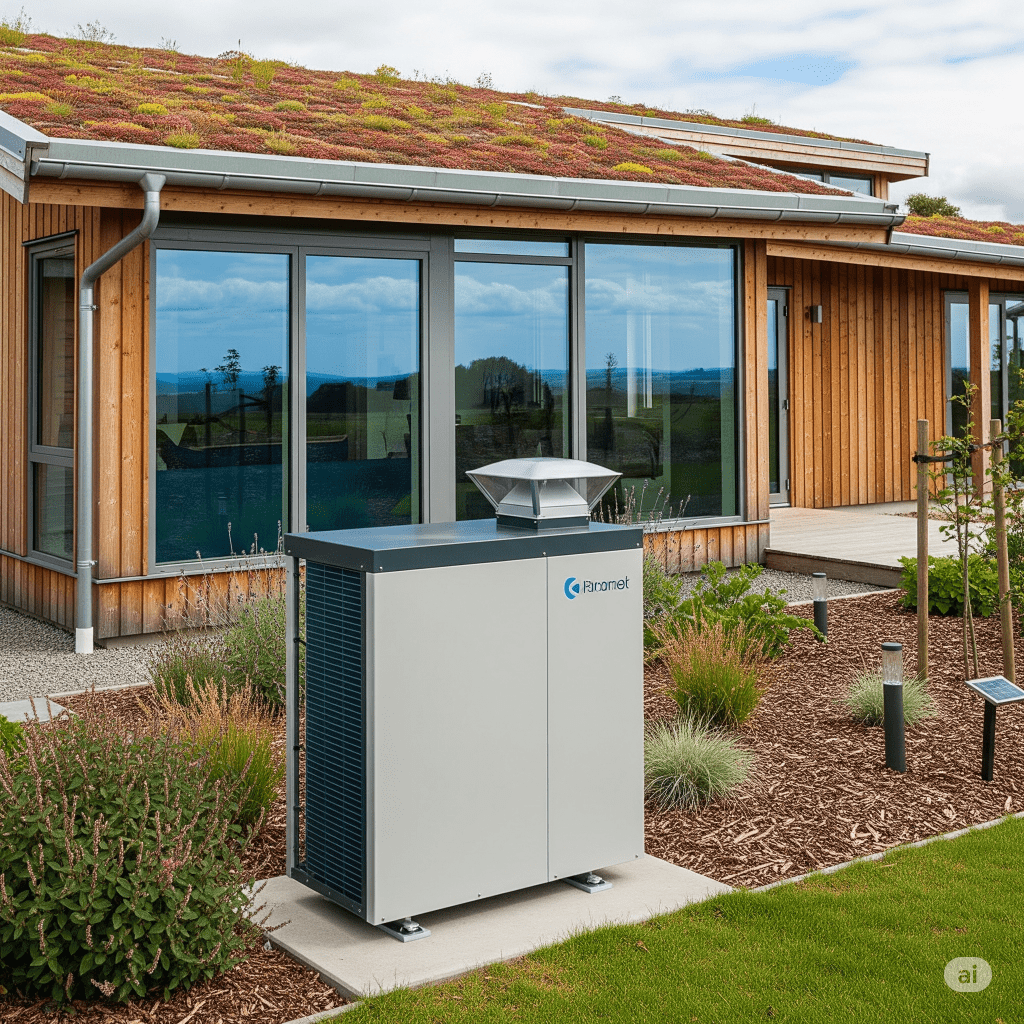Gas boilers and heat pumps are two prevalent options for heating homes, each with its own set of advantages and considerations. Gas boilers have been a traditional choice for many homeowners, providing reliable and efficient heating through the combustion of natural gas. Conversely, heat pumps are a more modern and environmentally friendly alternative, utilising electricity to transfer heat from the outside air or ground into the home.
Both systems have their own unique features and benefits, and selecting the appropriate option for one’s home depends on various factors such as energy efficiency, environmental impact, installation and maintenance considerations, heating performance, and cost. Gas boilers have long been a popular choice for heating homes due to their reliability and efficiency. They function by burning natural gas to heat water, which is then circulated through radiators or underfloor heating systems to provide warmth.
Gas boilers are known for their quick and consistent heat output, making them a reliable choice for colder climates. In contrast, heat pumps are a more modern alternative that use electricity to transfer heat from the outside air or ground into the home. This process makes them an environmentally friendly option, as they do not rely on the combustion of fossil fuels.
Heat pumps are also known for their versatility, as they can provide both heating and cooling for homes, making them a popular choice in regions with varying climate conditions.
Summary
- Gas boilers and heat pumps are both popular options for heating homes in the UK.
- When comparing energy efficiency and cost, heat pumps are generally more efficient but have a higher upfront cost compared to gas boilers.
- Heat pumps are more environmentally friendly as they produce lower carbon emissions compared to gas boilers.
- Consider the installation and maintenance requirements of both options before making a decision for your home.
- Heat pumps provide consistent heating performance and can offer a higher level of comfort in the home.
Energy Efficiency and Cost Comparison
When it comes to energy efficiency and cost comparison, both gas boilers and heat pumps have their own advantages and considerations. Gas boilers are known for their high energy efficiency, with modern condensing boilers achieving efficiency ratings of over 90%. This means that the majority of the energy from the natural gas is converted into heat, resulting in lower energy bills for homeowners.
However, the cost of natural gas can fluctuate, impacting the overall running costs of a gas boiler. On the other hand, heat pumps are also known for their high energy efficiency, with some models achieving efficiency ratings of over 300%. This is because heat pumps do not generate heat but rather transfer it from the outside environment into the home, making them a highly efficient heating option.
While heat pumps may have higher upfront costs compared to gas boilers, they can result in lower long-term running costs due to their high energy efficiency. Additionally, as heat pumps rely on electricity rather than natural gas, homeowners can benefit from more stable and predictable energy costs.
Environmental Impact and Eco-Friendly Homes

In terms of environmental impact and creating eco-friendly homes, heat pumps are often considered the more sustainable option compared to gas boilers. Gas boilers rely on the combustion of natural gas, which releases carbon dioxide and other greenhouse gases into the atmosphere, contributing to climate change. On the other hand, heat pumps use electricity to transfer heat from the outside environment into the home, resulting in significantly lower carbon emissions.
This makes heat pumps a more environmentally friendly choice for homeowners looking to reduce their carbon footprint and create a sustainable living environment. Furthermore, as the electricity grid continues to transition towards renewable energy sources such as wind and solar power, the environmental impact of heat pumps is expected to further decrease. This means that homeowners who choose heat pumps for their heating needs can contribute to a cleaner and more sustainable energy future.
Additionally, some regions offer incentives and rebates for installing heat pumps as part of efforts to promote eco-friendly homes and reduce carbon emissions.
Installation and Maintenance Considerations
| Consideration | Details |
|---|---|
| Installation Time | Estimated time required for installation |
| Maintenance Schedule | Frequency of maintenance required |
| Equipment Compatibility | List of compatible equipment and devices |
| Environmental Impact | Impact on the surrounding environment during installation and maintenance |
When it comes to installation and maintenance considerations, both gas boilers and heat pumps have their own unique requirements. Gas boilers require a flue or chimney for venting exhaust gases, as well as access to a natural gas supply. This means that installation can be more complex and may require professional expertise to ensure safety and compliance with building regulations.
Additionally, gas boilers require regular maintenance to ensure efficient and safe operation, including annual servicing and safety checks. On the other hand, heat pumps require professional installation to ensure proper sizing and placement for optimal performance. Depending on the type of heat pump (air source or ground source), installation may involve outdoor units or ground loops, which can impact landscaping and outdoor space.
However, once installed, heat pumps generally require less maintenance compared to gas boilers, with regular checks on filters and refrigerant levels being the primary requirements.
Heating Performance and Comfort
In terms of heating performance and comfort, both gas boilers and heat pumps can provide effective warmth for homes. Gas boilers are known for their quick and consistent heat output, making them a reliable choice for colder climates. They can also provide hot water for showers and taps at high pressure, ensuring comfort and convenience for homeowners.
However, gas boilers may result in drier indoor air due to the combustion process. On the other hand, heat pumps provide a gentle and even distribution of heat throughout the home, resulting in consistent comfort without the need for radiators or underfloor heating systems. Additionally, some heat pump models offer the added benefit of providing cooling during warmer months, further enhancing indoor comfort.
Heat pumps also do not produce dry air during operation, making them a popular choice for homeowners looking to maintain comfortable humidity levels in their homes.
Government Incentives and Rebates

Government Support for Sustainable Living
Additionally, some regions offer grants or subsidies for homeowners looking to upgrade from gas boilers to heat pumps as part of efforts to reduce carbon emissions and promote sustainable living.
Utility Company Incentives
Furthermore, some utility companies offer incentives for installing energy-efficient heating systems such as heat pumps, including discounted electricity rates or cash rebates for reducing energy consumption.
Long-term Benefits for Homeowners
By taking advantage of these government incentives and rebates, homeowners can offset some of the upfront costs associated with installing heat pumps and benefit from long-term energy savings.
Making the Right Choice for Your Home
In conclusion, both gas boilers and heat pumps have their own set of advantages and considerations when it comes to heating homes. Gas boilers are known for their reliability and quick heat output, making them a popular choice in colder climates. On the other hand, heat pumps offer high energy efficiency and eco-friendly operation, making them a sustainable choice for homeowners looking to reduce their carbon footprint.
When considering the right heating option for your home, it’s important to weigh factors such as energy efficiency, environmental impact, installation and maintenance requirements, heating performance, and cost. Additionally, exploring government incentives and rebates can help offset some of the upfront costs associated with installing energy-efficient heating systems such as heat pumps. Ultimately, the right choice for your home will depend on your specific needs and priorities.
Whether you opt for a gas boiler or a heat pump, investing in an energy-efficient heating system can result in long-term cost savings and contribute to a more sustainable living environment. By carefully considering all factors and exploring available incentives, homeowners can make an informed decision that aligns with their goals for comfort, efficiency, and environmental responsibility.
If you’re interested in making your home more eco-friendly, you might want to consider revolutionizing your composting game with the HotBin Compost Bin. This innovative solution promises efficient and odorless composting, making it a great addition to any environmentally conscious household. Check out the article on Eco Friendly Home and Garden to learn more about this game-changing product.
FAQs
What is a gas boiler?
A gas boiler is a heating system that uses natural gas to heat water, which is then circulated through radiators or underfloor heating to provide warmth in a building.
What is a heat pump?
A heat pump is a heating system that extracts heat from the air, ground, or water, and then uses it to heat a building. It can also be used for cooling in the summer.
How do gas boilers and heat pumps compare in terms of efficiency?
Heat pumps are generally more efficient than gas boilers, as they can produce more energy for heating than the amount of electricity they consume. Gas boilers, on the other hand, lose some energy through the flue and are not as efficient as heat pumps.
What are the environmental impacts of gas boilers and heat pumps?
Gas boilers produce carbon emissions when burning natural gas, contributing to climate change. Heat pumps, on the other hand, produce fewer carbon emissions as they use renewable sources of heat, such as the air or ground.
What are the installation and running costs of gas boilers and heat pumps?
Gas boilers generally have lower installation costs compared to heat pumps, but heat pumps have lower running costs due to their higher efficiency and lower energy consumption.
Which is more suitable for off-grid properties, gas boilers or heat pumps?
For off-grid properties, heat pumps are more suitable as they do not rely on a mains gas supply and can be powered by electricity, which can be generated from renewable sources.


